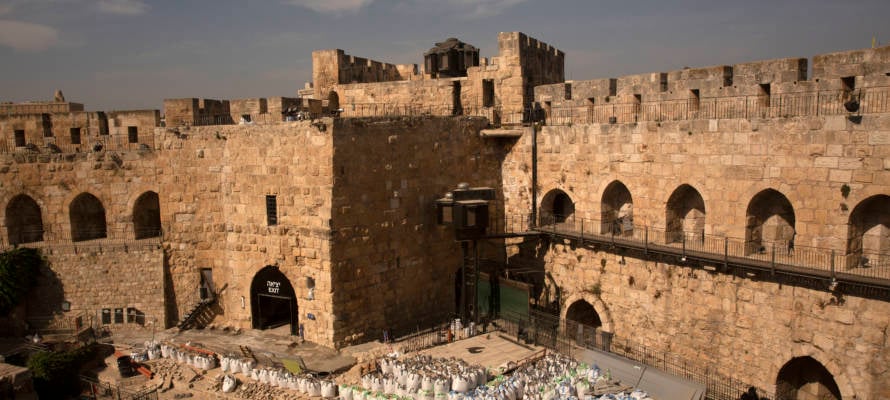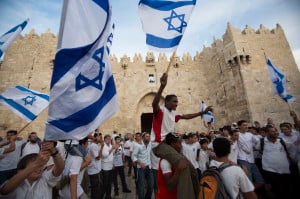According to the Talmud, 10 measures of beauty descended on the world, nine were taken by Jerualem and one by the rest of the world.
By Stephen M. Flatow
I’ve read what the Talmud says: “Ten measures of beauty descended on the world, nine were taken by Yerushalayim [Jerusalem], one by the rest of the world” (Kiddushin 49:2).
A beautiful thought if ever there was one. But the realist in me takes over and I see recycling bins overflowing with plastic bottles and newspapers. I will say, however, that the trash from our building is picked up daily and the streets and sidewalks are cleaner than ever as they get a regular sweeping.
But I still struggle with a question – what beauty was the Talmud referring to? Was it something physical or a state of mind?
I’ve been to the shuk (market] on Erev Shabbat [Friday, when people prepare for the Sabbath]. I’ve been on Ben Yehuda Street and watched diners drop food and wrappers on the ground. I’ve seen teens with streaks of blue and red hair throwing plastic bottles on the ground amid the cigarette butts. Not pretty.
I’ve been to Har HaBayit, the Temple Mount, where we are escorted by police and carefully walked around the site so as to not approach the sacred precincts of the Beit HaMikdash, the Holy Temple. Meanwhile, Arab children are playing soccer in the shadow of the Dome of the Rock where the Holy of Holies once stood. Indeed, you will find stores selling soccer balls in the shuk leading up to the Chain Gate entrance to Har HaBayit. We are like prisoners marching in a prison yard, but this is in our own land. Not a great feeling.
Many years ago, a wise person said to me, “Have you ever seen Biblical prophecy come true?” My silence led her to say, “Read Zechariah, chapter eight, verses four and five.” So, I did.
“Thus, said the L-rd of Hosts: There shall yet be old men and women in the streets of Jerusalem, each with staff in hand because of their great age. And the streets of the city shall be crowded with boys and girls playing in the streets.”
Now, years later, as olim chadashim [new immigrants to Israel], my wife and I could qualify as part of the “old men and women.” No, we don’t walk with canes, not yet, but the streets and parks near our apartment in the German Colony are filled with boys and girls riding their bicycles, playing basketball and kicking a soccer ball.
It will soon be Yom Yerushalayim – Jerusalem Day – my first here in Israel. My daughters, who attended midrashot, religious seminaries, in their gap year programs, walked the traditional celebratory march around the Old City. Let me say that the march is not on my bucket list, but kol hakavod [all the honor] to those who make the trek.
On my first attempt to walk to shul (synagogue) from our apartment on a hot-summer Shabbat evening, I wound up doing what seemed to be my own march around the city. I tried to follow the walking instructions I culled from Google. Well, let me say I got a little lost on the Mesilla Park walkway, and what should have been a 10-minute walk turned into a 25-minute one. After prayers, I thought I knew exactly where I had gone wrong. I promptly proceeded to make a wrong turn again and it wasn’t until I saw the Orient Hotel ahead of me that I knew where I was. Somewhat exhausted, I climbed the steps to our apartment and we had our first Shabbat dinner as Israeli citizens.
The next afternoon, it hit me that the “nine measures of beauty” were not necessarily strictly physical measures. My tiyul (hike) to shul took me through side streets I would have never known existed, and as I wandered those streets, I realized they were full – house after house – of Jewish families. The synagogue, one of the oldest in my area, founded by survivors of the Shoah, is vibrant, and the melodies I heard were for the most part recognizable. We have returned.
On that Shabbat afternoon, as we sat on our balcony, Rosalyn turned to me and said, “Do you hear that?”
“Hear what?” I answered.
“The silence.”
She was right. I wanted to put out my hand to touch the peace of Shabbat, and I knew that it, too, was a measure of beauty one could only experience in Yerushalayim.
Stephen M. Flatow is a new immigrant and resides in Jerusalem. He is a member of the board of Nishmat and a vice-president of the Religious Zionists of America. His daughter Alisa was murdered by Palestinian Arab terrorists in 1995. He is also the author of “A Father’s Story: My Fight for Justice Against Iranian Terror.”
This essay originally appeared in HaMizrachi Magazine and is reprinted by permission of the author.
Sign the Declaration to Keep Jerusalem United
Jerusalem Must Remain the United Capital of Israel
I declare that Jerusalem is the eternal capital of the Jewish People and support all efforts to maintain and strengthen a united Jerusalem as the undivided capital of the State of Israel.
Do You Love Israel? Make a Donation - Show Your Support!
Donate to vital charities that help protect Israeli citizens and inspire millions around the world to support Israel too!
Now more than ever, Israel needs your help to fight and win the war -- including on the battlefield of public opinion.
Antisemitism, anti-Israel bias and boycotts are out of control. Israel's enemies are inciting terror and violence against innocent Israelis and Jews around the world. Help us fight back!





